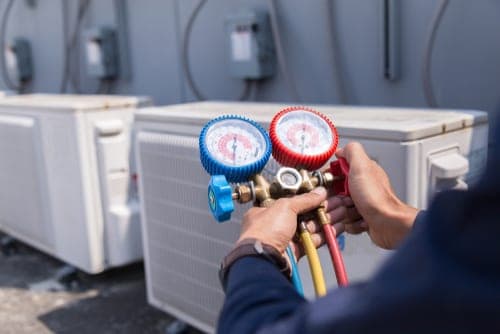How to Pick the Right Heating And Cooling System for Your Needs
Picking the suitable heating and cooling system is a critical decision that requires mindful factor to consider of different factors. Begin by reviewing your home's dimension, design, and one-of-a-kind needs, as these elements determine the essential capability and setup of the system. In addition, developing a budget plan that incorporates installation and long-lasting operational prices is important. As you evaluate your options, recognizing energy performance rankings and the implications of your regional climate will certainly play a significant duty in your choice. The myriad of system kinds offered can complicate this process, leading one to wonder which course eventually leads to optimum comfort and effectiveness.
Assess Your Home Size
Evaluating your home size is an important primary step in selecting the appropriate HVAC system. The dimension of your home straight influences the home heating and cooling ability required for efficient environment control. A cooling and heating system that is also tiny will certainly have a hard time to maintain comfortable temperature levels, leading to increased power consumption and use on the device. On the other hand, an extra-large system can result in short biking, inadequate humidity control, and inefficient procedure.
To properly analyze your home size, gauge the square video footage of each room, thinking about aspects such as ceiling elevation and the format. Additionally, take into consideration the insulation quality and the variety of windows, as these aspects impact thermal performance. Houses with open flooring plans may call for various system setups compared to those with many separated areas.
Using the Handbook J load estimation method can give a more specific estimate of your a/c requires. This approach accounts for numerous variables, including local environment, solar gain, and tenancy patterns. By meticulously examining these elements, you can ensure that your picked cooling and heating system is properly sized, resulting in enhanced comfort, power performance, and durability of the devices.
Determine Your Spending Plan
Establishing your spending plan is a pivotal action in the heating and cooling system option process, as it sets the criteria for your choices - DMAKS HVAC. A HVAC system is a significant financial investment, and recognizing your financial limitations will aid narrow down selections that fit within your methods
Begin by analyzing not only the initial acquisition rate but also installation expenses, which can vary substantially depending on the intricacy of the project. Additionally, think about recurring expenditures such as upkeep, repairs, and power usage. A system might appear budget-friendly originally but can cause higher prices over time if it is less reliable.
It is advisable to allot a backup fund for unanticipated costs that may occur throughout setup or initial system adjustments (DMAKS HVAC). In addition, explore funding options or rebates that might be available, as these can ease the problem of upfront expenses
Inevitably, having a clear budget plan allows you to involve with heating and cooling specialists extra efficiently, ensuring you get customized recommendations that straightens with your financial goals and home requirements. By being attentive about your budget plan, you can make informed decisions that improve convenience without jeopardizing financial stability.
Evaluate Energy Efficiency
Energy effectiveness plays a vital duty in the overall efficiency and cost-effectiveness of your A/c system. Look for systems with a high Seasonal Energy Effectiveness Ratio (SEER) for cooling and a high Annual Gas Usage Effectiveness (AFUE) ranking for heating.
Furthermore, think about the Power Celebrity certification, which indicates that the system fulfills rigid effectiveness guidelines established by the Environmental Protection Firm. Buying a Power Star-rated cooling and heating system can cause considerable financial savings in time, especially in areas with severe temperature fluctuations.
One more variable to assess is the system's size and ability. An oversized or undersized system can cause inadequacy and raised energy expenses. DMAKS HVAC. Proper sizing, often determined with a Hands-on J load estimation, ensures that the system operates at ideal effectiveness


Consider Environment and Environment
When choosing a HVAC system, it is crucial to think about my company the regional climate and ecological conditions, as these factors considerably influence the system's performance and find more info performance. Various regions experience varying temperature extremes, moisture levels, and seasonal modifications, all of which impact home heating and cooling down demands.

Furthermore, regional environmental variables, such as air quality and potential irritants, must notify your option. Equipments equipped with sophisticated purification technologies can help alleviate contaminants and provide cleaner air. Additionally, think about the energy sources offered in your area-- some heating and cooling systems are a lot more reliable when powered by all-natural gas or sustainable power sources.
Ultimately, straightening your heating and cooling system selection with your neighborhood environment and environmental factors to consider will lead to improved convenience, boosted effectiveness, and reduced energy costs.
Explore System Types and Features
As homeowners seek to maximize convenience and effectiveness, discovering the different kinds of a/c systems and their special functions comes to be essential. The key types of heating and cooling systems include air conditioning, warmth pumps, ductless mini-split systems, and heaters. Each system uses unique advantages customized to different demands and preferences.
Central air systems provide uniform air conditioning throughout a home, making them optimal for bigger rooms. Heatpump act as both home heating and cooling down solutions, using electricity to move warmth, which can result in lower energy expenses. Ductless mini-split systems are ending up being progressively popular due to their adaptability and simplicity of setup, allowing house owners to manage the temperature level in specific spaces without extensive ductwork.

Verdict
Finally, selecting the proper a/c system necessitates mindful factor to consider of numerous aspects, including home dimension, budget plan restrictions, energy effectiveness, regional climate, and readily available system types. A detailed assessment of these elements guarantees optimum comfort and cost-effectiveness. By following an organized method, house owners can make educated choices that align with their particular requirements and preferences, inevitably bring about boosted interior air quality and power savings.